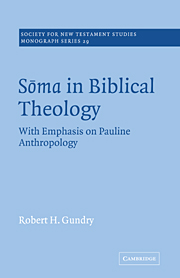Book contents
- Frontmatter
- Contents
- Acknowledgements
- Abbreviations
- PART I FOR AND AGAINST A HOLISTIC DEFINITION OF SŌMA
- 1 Sōma as the whole person: the rise of a definition
- 2 Sōma in extra-Biblical literature
- 3 Sōma in the LXX
- 4 Sōma in the NT outside Pauline literature
- 5 The alternation of Sōma with personal pronouns in Pauline literature
- 6 Sōma elsewere in Pauline literature
- 7 Sōma in I Cor 6: 12–20
- PART II SŌMA IN THE FRAMEWORK OF ANTHROPOLOGICAL DUALITY
- PART III THE THEOLOGY OF SŌMA AS PHYSICAL BODY
- Select bibliography
- Index of passages cited
- Index of authors
5 - The alternation of Sōma with personal pronouns in Pauline literature
Published online by Cambridge University Press: 14 January 2010
- Frontmatter
- Contents
- Acknowledgements
- Abbreviations
- PART I FOR AND AGAINST A HOLISTIC DEFINITION OF SŌMA
- 1 Sōma as the whole person: the rise of a definition
- 2 Sōma in extra-Biblical literature
- 3 Sōma in the LXX
- 4 Sōma in the NT outside Pauline literature
- 5 The alternation of Sōma with personal pronouns in Pauline literature
- 6 Sōma elsewere in Pauline literature
- 7 Sōma in I Cor 6: 12–20
- PART II SŌMA IN THE FRAMEWORK OF ANTHROPOLOGICAL DUALITY
- PART III THE THEOLOGY OF SŌMA AS PHYSICAL BODY
- Select bibliography
- Index of passages cited
- Index of authors
Summary
J. Weiss thinks that Paul developed the meaning ‘personality’ for sōma de novo and admits lack of evidence for such a usage elsewhere in Greek literature. Whether or not agreeing with Weiss, Bultmann contents himself with exegetical arguments from the writings of Paul. Such arguments commonly begin with Pauline passages where the word stands parallel to a personal pronoun or can be replaced by a personal pronoun.
We first consider Rom 6: 12–14, 16a:
Let not sin therefore reign in your mortal body to make you obey its passions. Do not yield your members to sin as instruments of wickedness, but yield yourselves to God as men who have been brought from death to life, and your members to God as instruments of righteousness. For sin will have no dominion over you, since you are not under law but under grace… Do you not know that if you yield yourselves…
In the parallel statements ‘Let not sin therefore reign in your mortal body’ and ‘For sin will have no dominion over you’ sōmati, ‘body’, and hymōn, ‘you’, appear to be interchangeable. Moreover, in the parallel phrases ‘yield your members’ and ‘yield yourselves’, melē, ‘members’, as a synonym for sōma twice alternates with heautous, ‘yourselves’ (cf. v. 19). The conclusion drawn is that sōma must have as broad a meaning as the personal pronouns – and therefore include the whole person.
- Type
- Chapter
- Information
- Soma in Biblical TheologyWith Emphasis on Pauline Anthropology, pp. 29 - 33Publisher: Cambridge University PressPrint publication year: 1976
- 1
- Cited by



